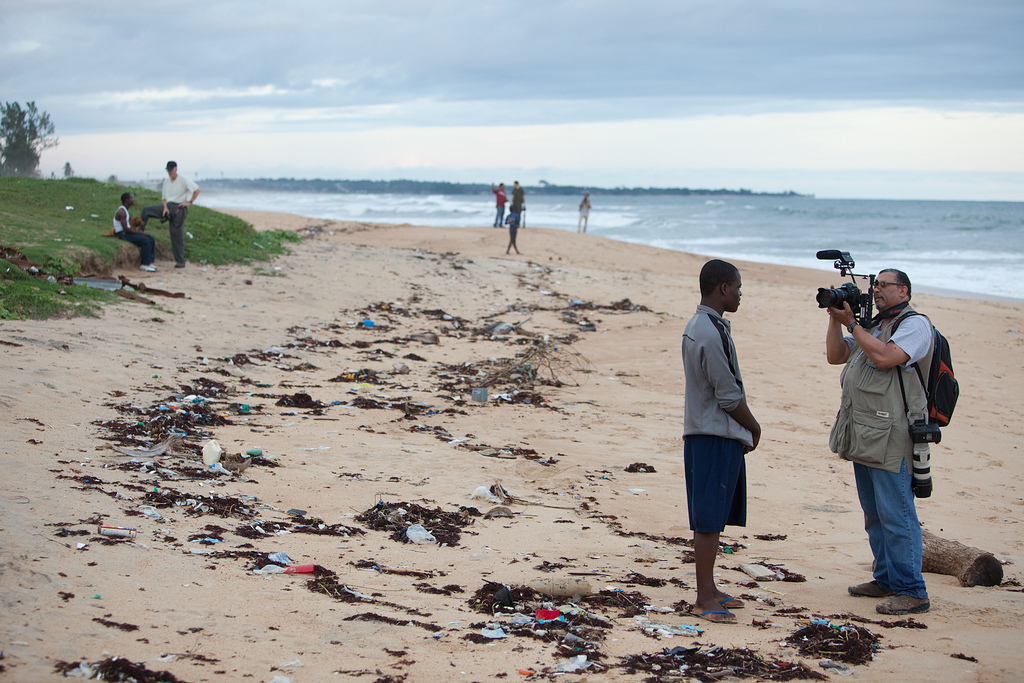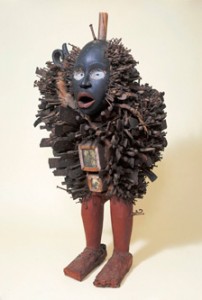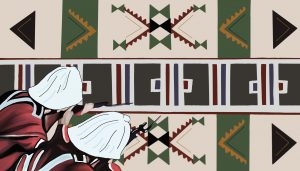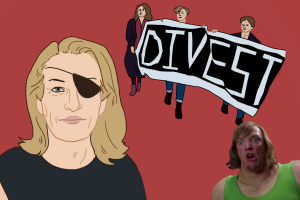
All Quiet on the African Front: A troubling blind spot in the British press
by Noah Lachs | March 14, 2015
Ask somebody what they know about the Second Congo War and you will receive one of two responses. Either there will be a look of blankness accompanied by a comment like “I didn’t even know there was a first Congo War”, or, the respondent’s eyes will drift as they struggle to gather vague fragments of Afro-centric information. Muffled phrases like “child-soldiers” may be gleaned from subjects ashamed of their ignorance.
However, the public is not fully culpable for its cluelessness. Much of the blame belongs to the British press. The Second Congo War involved 5.4 million deaths, millions more displacements, and intervention from nine different African States and 25 distinct armed groups. There have been innumerable rapes, the plundering of one of the world’s most luxurious mineral deposits, and the establishment of the largest UN peacekeeping operation to date (MONUSCO). Why did the years of the conflict (1998–2003) not flood the pages of the British media, and why is the extant precarious aftermath so rarely reported on?
It is necessary to view Congo’s recent conflicts through the frame of its history. Twenty-three years of Belgian colonial rule led to 10 million Congolese deaths. King Leopold II enforced the violent exploitation of natives: families of workers who did not procure sufficient rubber were held hostage; workers who still failed to satisfy the incumbent quotas had their hands cut off or their villages razed. Colonial oppression set in motion a spiral of brutality that has yet to be halted. Both Congo wars spark from the embers of the 1994 Rwandan genocide. Post-genocide, Congo, at that time called Zaire, absorbed much of the Rwandan Hutu population – the perpetrators of the Tutsi slaughter. Many fled fearing reprisal killings at the behest of the new Tutsi government. However, the Hutu exodus did not allay Rwanda’s security concerns. Political Scientist and Rwanda expert, Dr Golooba-Mutebi explains that this created a “looming threat of Hutu insurgents close to its borders”. This invoked the new Tutsi-led government to instigate regime change in Zaire and implant Laurent Kabila as ruler of what would become the Democratic Republic of Congo (DRC). The violence that enforced this change constituted the First Congo War. A political instrument of Rwanda, Dr Golooba-Mutebi explains that Kabila’s role was to “make the DRC inhospitable for the Hutu ‘genocidaires’”.
Kabila did not achieve this and became less and less complicit with the Rwandan government. In 1998, backed by its Ugandan allies, Rwanda set about ousting its former puppet. This culminated in the Second Congo War. Rwanda bolstered anti-Kabila rebel groups within the DRC, blurring the line between civil war and foreign aggression. Namibia, Chad, Angola and Zimbabwe viewed the actions of Uganda and Rwanda as an aggressive violation of Congolese sovereignty and also decided to intervene. Kabila perceived Rwanda and Uganda’s claims to be protecting their security as deceptive bluster, serving to legitimise their pillaging of the Congo’s mineral-rich East.
The lack of British media attention to the Second Congo War is symptomatic of its political relationship with the region . Comparing French and American coverage with that of the British press highlights this. Between 1998 and 2001 (the year in which Kabila was assassinated), Le Monde featured 641 articles on the war, whilst the New York Times boasted 269. The British papers The Guardian and The Times trailed behind, publishing 191 and 106 respectively. These articles were seldom found outside the “World” sections. A similar trend is reflected in broadcasting. In the first week of January, the BBC’s website posted two DRC-related headlines, both dealing with the shooting and recovery of a Northern Irish missionary. Unlike France 24, they did not choose to cover the two other fairly major incidents of that week: huge clashes between Congolese rebels and Burundian troops, and a controversy involving the taxation of a hospital for rape victims.
The broader extent of French and American journalistic activity corresponds to the nations’ respective political interests. The Clinton administration, reeling with guilt for its inaction during the Rwandan genocide, supported Rwandan claims. American foreign policy turned a blind eye to the atrocities committed by the Rwandan-backed rebel groups in light of Rwanda’s voiced security concerns. American guilt is enduring; Clinton was quoted in March 2013 saying: “If we’d gone in sooner, I believe we could have saved at least a third of the lives that were lost.” France backed Rwanda’s Hutu-majority government and is responsible for arming and training many of the forces that went on to commit the Tutsi genocide. Since the genocide, Franco-Rwandan relations remain tense. In 2014, Rwanda’s Tutsi President, Paul Kagame, accused France of playing a “direct role” in the mass killings of 1994. Lacking France’s historical-political links with the region, and America’s genocide-induced guilt complex, Britain exercised a foreign policy which was largely ambivalent. Whilst Britain remains politically disinterested, its media remains uninterested.
The bloodshed and human rights abuses of the Second Congo War often overshadow the ongoing corruption and plundering of resources set in motion by the conflict. In 2012, the DRC produced more than 90 per cent of China’s cobalt – an element necessary for the production of the modern mobile phone. Compound this with the DRC’s bounteous supplies of other minerals including tin, tungsten, tantalum and gold, and the potential for mass exploitation becomes very clear. Currently, armed groups are usurping much of the revenue from Congolese resources. Rwanda, Uganda and Burundi facilitate trade with the international market by way of allowing exports to transit through their countries. It is no coincidence that during the conflict’s peak in early 2000, Uganda and Rwanda became the largest exporters of diamond and copper on the world market. By supporting anti-Hutu rebel groups within the DRC, Rwanda claims to be eliminating a genocidal threat to its Tutsi majority. Others perceive what a UN report in 2002 termed “mass scale looting”. Dr Golooba-Mutebi nuances this latter point: “In talking about who is ‘looting’ Congolese wealth, one should not lose sight of who is buying the minerals.”
In 2001, Afrimex was one of 12 UK companies scrutinised by a UN “Panel of Experts” for mineral exploitation in the DRC. Global Witness, an NGO which works to uncover corruption and exploitation, asserts that “the company had bought minerals produced in very harsh conditions, including forced and child labour”. They also suggest that Afrimex “made payments to Rassemblement congolais pour la démocratie-Goma ” – the violent rebel group controlling the mining area. Contrary to Global Witness advice, Parliament has not introduced legislation to criminalise companies like Afrimex. The height of government action in this case was to recommend Afrimex to take a course of “due diligence”. The EU Corporate Social Responsibility Report reveals the laxity of UK law: “By UK law…the director of a public limited liability company must consider the long-term consequences of all decisions.” This ruling, were its consequences remotely palatable, could be deemed comic for its sheer vacuity. One would assume the press would be quick to criticise the government for this, yet the media seldom mentions mineral consumption and exploitation.
Looking to 2014, we gain some understanding as to why the British press neglects to report on mineral exploitation. Dr Golooba-Mutebi affirms that “certificates of origin have rendered export of conflict minerals by Rwanda and Uganda extremely difficult”. As a result Western, Chinese, and Lebanese traders seek alternative methods of amassing Congolese resources, as Dr Golooba-Mutebi puts it, “on the cheap”. Amongst these are British oil company Soco International, who have been exploring for oil in one of Africa’s oldest national parks. Virunga, situated in the DRC’s North-East is home to a quarter of the world’s 880 remaining mountain gorillas, and more species of mammal than any other national park in the continent. In order to gain unimpeded access to this region, Global Witness suggests that Soco paid-off rebel groups and local MPs. Activists have been beaten and stabbed and park rangers spied on. In the words of Global Witness’s Nat Dyer: “Soco is threatening Africa’s oldest national park through an oil project marred by bribery, intimidation and violence.” On the day that Global Witness released its report on this case, The Guardian, The Times, the Financial Times, BBC, ITV and Channel 4 said nothing. Soco International is represented by Schillings, the same law firm that, for many years, silenced doping accusations made against Lance Armstrong. Before such formidable firms, the British press cowers. Freedom of expression has saturated public discourse recently; much focus is on the risks posed by radicals opposed to what is framed as a principle upheld by western legal systems. However, a greater threat may be found within these systems – in the form of English libel law. Nat Dyer laments: “Congo has lost out on huge amounts of resources because of opaque deals.” If political interest and legal threat were subtracted from the equation, perhaps the press could add some transparency.




